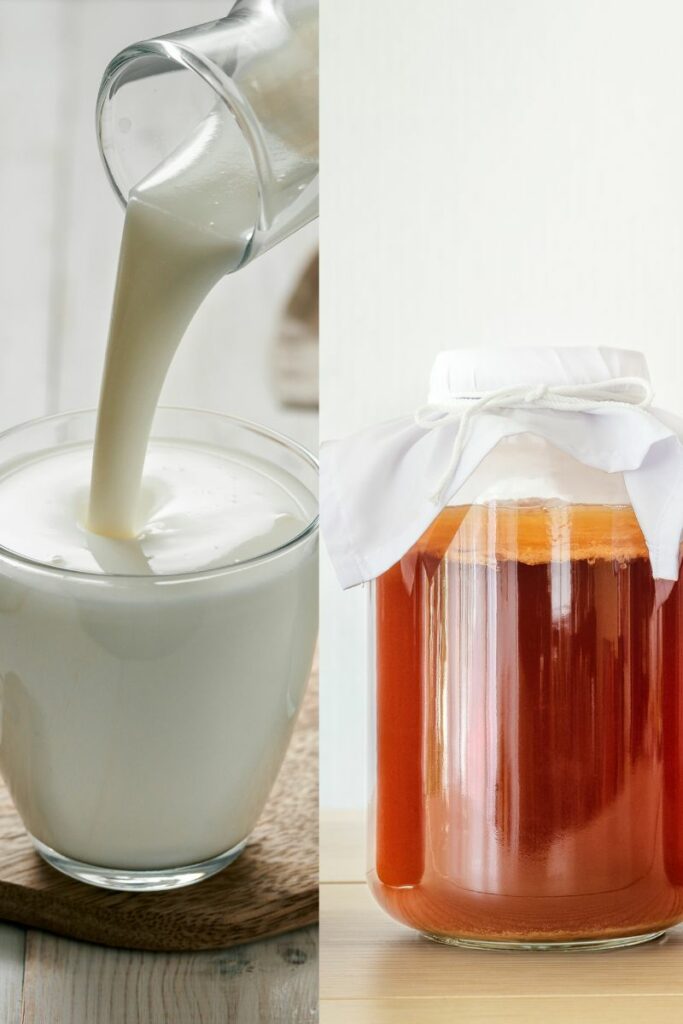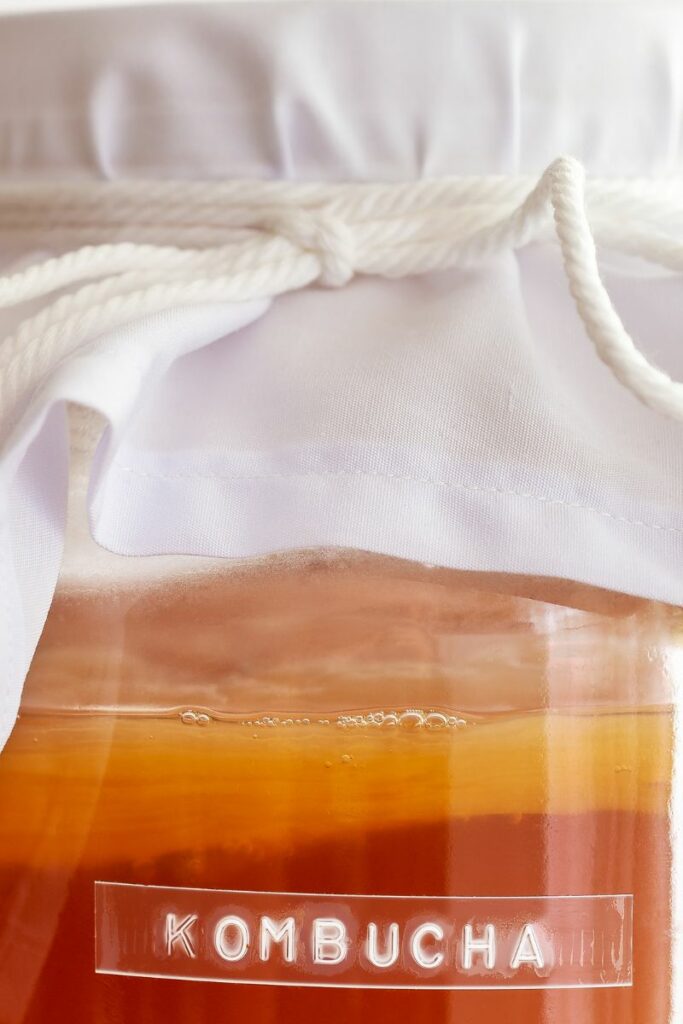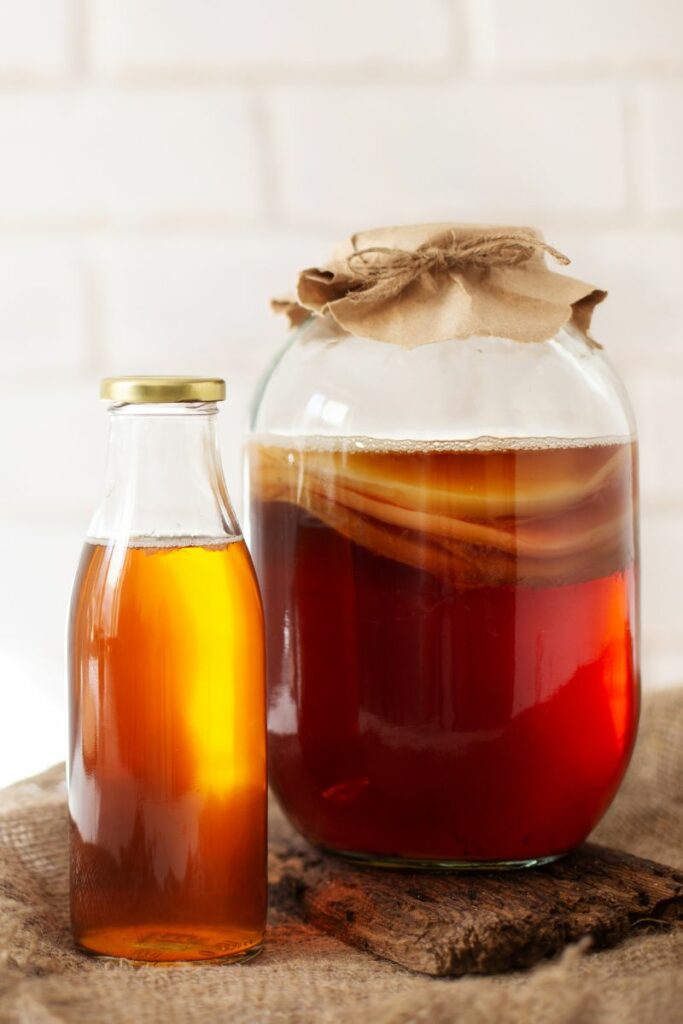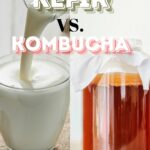Kefir vs Kombucha: Which Fermented Drink Is Better?
Kefir vs Kombucha: These two probiotic-rich beverages have gained popularity for their health benefits, but which one is the best choice for you?

In recent years, fermented drinks like kefir and kombucha have become super popular. People love them because they are tasty and packed with health benefits. These drinks are known as probiotic-rich beverages because they contain good bacteria that can help improve your overall health.
Kefir and kombucha are two of the most well-known fermented drinks. Kefir can be made from cow’s milk, coconut milk, or even plain water. When it’s made with water, it's called water kefir. The main ingredients in kefir are kefir grains, which are actual grains made up of a combination of beneficial bacteria and yeast species. These grains ferment the liquid, turning it into a healthy, fizzy drink.
Kombucha, on the other hand, is usually made with sweet tea. The key ingredient is a kombucha scoby, also known as a symbiotic culture of bacteria and yeast. This scoby ferments the tea, creating a tangy and slightly sweet drink that’s also filled with good bacteria.
In this article, we’ll compare the benefits, taste, and overall value of kefir and kombucha to figure out which fermented beverage is better. We’ll look at their health benefits, how they taste, and other factors that might help you decide which one to try. By the end, you’ll know more about these probiotic drinks and which might be the best option for you.

What is Kefir?
Definition and Origins
Kefir is a fermented beverage that has been around for centuries. It originated in the Caucasus Mountains and is known for its unique combination of beneficial bacteria and yeast. These microorganisms form what we call kefir grains, which look like small clumps of cauliflower.
Types: Milk Kefir vs. Water Kefir
There are two main types of kefir: milk kefir and water kefir. Milk kefir is made using cow’s milk, goat’s milk, or coconut milk. Water kefir, also known as kefir water, is made using water kefir grains and a sugar-containing liquid like sugared water or fruit juice. Both types are fizzy drinks filled with good bacteria.
Nutritional Profile
Kefir is a nutrient powerhouse. It is packed with probiotic bacteria, which are good for your gut. It also contains B vitamins, calcium, magnesium, and other minerals that support overall health. The exact nutritional content can vary depending on the type of milk or liquid used.
Health Benefits
The main benefit of kefir is its high probiotic content. Here are some health benefits:
- Gut Health:
- Balances the gut microbiome.
- Aids in digestion.
- Prevents upset stomach.
- Immune Support:
- Boosts your immune system.
- Helps fight bad bacteria.
- Overall Wellness:
- May aid in weight loss.
- Supports cholesterol levels.
- Contains organic acids and B vitamins.
How It's Made: The Fermentation Process
Making kefir involves a simple fermentation process. For milk kefir, you add milk kefir grains to your chosen type of milk. For water kefir, you add water kefir grains to sugared water or fruit juice. The kefir grains ferment the liquid at room temperature, producing an effervescent tonic filled with live cultures. The process usually takes 24 to 48 hours.
Taste and Texture
- Milk Kefir:
- Creamy texture.
- Sour taste similar to yogurt.
- Water Kefir:
- Lighter and more refreshing.
- Can be flavored with fruit juice or coconut water, giving it a taste similar to a fizzy soda.
Kefir is a great option for anyone looking to improve their overall health with a probiotic-rich beverage. Whether you prefer the creamy taste of milk-based kefir or the refreshing taste of water kefir, this fermented drink offers numerous health benefits and is easy to make at home.

What is Kombucha?
Definition and Origins
Kombucha is a fermented beverage made from sweetened tea. It has been enjoyed for centuries, especially in East Asia. The drink is created using a kombucha culture, also known as a symbiotic colony of bacteria and yeast (SCOBY). This culture looks like a rubbery disc and is key to fermenting the tea.
Nutritional Profile
Kombucha is rich in probiotics, which are good bacteria for your gut. It also contains antioxidants, organic acids like acetic acid, B vitamins, and a small amount of alcohol (less than 0.5%).
Health Benefits
The main benefit of kombucha is its probiotic content. Here are some health benefits:
Gut Health:
- Helps maintain a healthy gut microbiome.
- Aids in digestion and can prevent an upset stomach.
- Promotes a healthy GI tract and digestive system.
Immune Support:
- Boosts the immune system.
- The antioxidants help detoxify the body.
Overall Wellness:
- Can aid in weight loss.
- May help manage cholesterol levels.
- Acts as a general digestive aid.
How It's Made: The Fermentation Process
Making kombucha involves a few key steps:
Brewing the Tea: Start with hot water and brew green tea, black tea, or herbal tea. Sweeten the tea with cane sugar.
Fermentation: Add a kombucha starter culture (SCOBY) and some starter tea (previously brewed kombucha) to the sweetened tea. Cover the jar with a cloth and secure it with a rubber band. Let it ferment at room temperature for 7 to 10 days. The SCOBY will consume the sugar, producing probiotics, acetic acid, and a small amount of alcohol.
Secondary Fermentation (Optional): For a fizzy drink, you can do a second fermentation. Transfer the kombucha to bottles and add fruit juice or more cane sugar. Let it ferment for a few more days.

Taste and Texture
Kombucha has a unique taste and texture:
Flavor:
- It has a tangy, slightly sweet, and sometimes a bit of a bitter taste.
- The flavor can be similar to pungent sparkling apple cider or apple cider vinegar.
- The taste of kombucha can vary depending on the tea used and the length of fermentation.
Texture:
- It is an effervescent tonic, meaning it's bubbly and fizzy.
Kombucha is an excellent choice for those looking to boost their overall health with a probiotic-rich drink. Whether you prefer the taste of green tea, black tea, or herbal tea, kombucha offers a refreshing and healthy option. Making homemade kombucha can also be a fun and rewarding experience, allowing you to experiment with different flavors and fermentation times.
Health Benefits Comparison
Probiotic Content: Kefir vs Kombucha
Both kefir and kombucha are probiotic drinks, which means they contain good bacteria that help your gut. Kefir, whether it's milk kefir or water kefir, is packed with a variety of probiotic bacteria, including lactic acid bacteria. These bacteria create a big ecosystem in your digestive tract, helping to balance the gut microbiome and support a healthy gut.
Kombucha, made from sweetened tea (like green tea or black tea), also contains probiotics, thanks to its kombucha culture or SCOBY (symbiotic colony of bacteria and yeast). The probiotics in kombucha tea are slightly different but still beneficial for your digestive system.

Digestive Health: Which is Better for Your Gut?
Kefir:
- Balances the gut microbiome.
- Aids in digestion.
- Prevents upset stomach.
- Acts as a digestive aid.
Kombucha:
- Promotes a healthy GI tract.
- Helps maintain a healthy gut microbiome.
- Aids in digestion and can prevent an upset stomach.
- Acts as a digestive aid similar to apple cider vinegar.
Both drinks help keep your digestive system healthy, but kefir might have a slight edge because of its higher probiotic content.
Immune System Support
Probiotic drinks like kefir and kombucha also support your immune system. The probiotics help fight bad bacteria and boost your overall immunity. Kombucha, with its antioxidants from green tea or black tea, also helps detoxify the body, adding an extra layer of immune support.
Potential Drawbacks and Considerations
While both drinks have many health benefits, there are a few things to keep in mind:
Sugar Content:
- Kefir: Water kefir is made with sugar water or fruit juice, and milk kefir uses the natural sugars in milk. The sugar is mostly consumed during fermentation, but some may remain.
- Kombucha: Made with sweetened tea and cane sugar, kombucha can have a higher sugar content, especially if you add more sugar during secondary fermentation.
Alcohol Content:
- Both kefir and kombucha can contain a small amount of alcohol (less than 0.5%) due to fermentation. This is generally not enough to be concerning but is worth noting.
Acidity:
- Kombucha: The acetic acid in kombucha gives it a tangy, sometimes bitter taste, similar to apple cider vinegar. Some people might find this acidity harsh on their stomach.
- Kefir: Kefir has a sour taste but is usually less acidic than kombucha.
In the debate of kombucha vs. kefir, both drinks are excellent choices for improving overall health. Your personal preference, individual needs, and tolerance for sugar, alcohol, and acidity will help you decide the best way to include these functional beverages in your diet.

Taste and Texture
Flavor Profiles: Tangy vs. Tart
Kombucha:
- Kombucha tea has a tangy, slightly sweet flavor. The taste can be similar to pungent sparkling apple cider or apple cider vinegar, especially if made with green tea or black tea. The taste of kombucha can also have a slight bitter taste depending on the tea used and the fermentation time.
Kefir:
- Kefir has a tart, sour taste, similar to yogurt. Water kefir, also known as kefir soda, is lighter and can be flavored with fruit juice or herbal tea, giving it a refreshing, fizzy soda-like taste. The taste of kefir can vary based on the ingredients used and the fermentation process.
Carbonation Levels
Kombucha:
- Kombucha is known for its effervescent, bubbly texture. During fermentation, the kombucha culture (SCOBY) produces carbonation, making it a fizzy drink. The carbonation can be increased with a second fermentation by adding fruit juice or cane sugar.
Kefir:
- Kefir is also a fizzy drink but generally has a lighter carbonation than kombucha. Milk-based kefir has a creamy texture with gentle bubbles, while water kefir has a more soda-like carbonation, especially if fruit juice is added during secondary fermentation.

Versatility in Recipes and Beverages
Kombucha:
- Kombucha can be enjoyed on its own or used in various recipes. It pairs well with fruit juices and can be a base for smoothies or cocktails. The versatility of kombucha allows you to experiment with different flavors and types of tea (green tea, black tea, or herbal tea).
Kefir:
- Kefir is highly versatile and can be used in many ways. Milk kefir can be added to smoothies, used in salad dressings, or enjoyed as a drink. Water kefir can be flavored with fruit juice or herbal tea, making it a fun and tasty alternative to soda. You can also follow different water kefir recipes to create unique flavors.
Personal Preference
When it comes to taste and texture, it’s all about personal preference. If you enjoy a tangy, slightly sweet, and fizzy drink, kombucha might be the best option for you. If you prefer a tart, creamy drink or a lighter, soda-like beverage, kefir could be your choice.

Popular Brands and Products of Kefir and Kombucha
Top Kefir Brands to Try
- Lifeway Kefir:
- Known for a wide variety of flavors.
- Offers both milk-based and water kefir options.
- Available in grocery stores and online.
- Wallaby Organic:
- Offers organic kefir made from cow’s milk.
- Known for a smooth and creamy texture.
- Available in health food stores and online.
- Redwood Hill Farm:
- Specializes in goat milk kefir.
- Known for its tangy taste and high probiotic content.
- Available in health food stores and online.
- GT’s Living Foods Water Kefir:
- Offers flavored water kefir.
- Known for its refreshing, soda-like taste.
- Available in grocery stores and online.
Top Kombucha Brands to Try
- GT’s Kombucha:
- One of the most popular and widely available brands.
- Offers a variety of flavors and types, including green tea and black tea kombucha.
- Available in grocery stores, health food stores, and online.
- Health-Ade Kombucha:
- Known for small-batch brewing and high-quality ingredients.
- Offers unique flavors and organic options.
- Available in grocery stores, health food stores, and online.
- Brew Dr. Kombucha:
- Uses organic teas and natural ingredients.
- Offers a variety of flavors, including herbal tea blends.
- Available in grocery stores, health food stores, and online.
- Humm Kombucha:
- Known for its light and refreshing taste.
- Offers both regular and zero-sugar options.
- Available in grocery stores, health food stores, and online.
Where to Buy
You can find both kefir and kombucha in various places:
- Grocery Stores:
- Many large grocery store chains carry popular brands of kefir and kombucha.
- Look in the refrigerated health food or beverage sections.
- Health Food Stores:
- Stores like Whole Foods, Sprouts, and local health food stores often have a wide selection of both kefir and kombucha.
- They may also offer unique and specialty brands.
- Online Options:
- Websites like Amazon, Thrive Market, and the brands' own websites offer kefir and kombucha.
- Buying online can provide more variety and convenience, especially for hard-to-find flavors or brands.
These popular brands offer delicious and healthy options for kefir and kombucha lovers. Whether you prefer the tangy taste of kombucha or the creamy texture of kefir, you can easily find these drinks at grocery stores, health food stores, or online.
Kefir vs Kombucha
Based on our findings, both kefir and kombucha are excellent choices for improving your overall health. If you prefer a creamy, yogurt-like drink or a light, soda-like beverage, kefir might be the best option for you. On the other hand, if you enjoy a tangy, fizzy drink with a taste similar to apple cider vinegar, kombucha could be your top pick.
Ultimately, the best way to decide which fermented drink suits your lifestyle better is to try both kefir and kombucha. Experiment with different flavors and brands to find what you enjoy most. Both drinks offer numerous health benefits and can be a tasty addition to your diet. Whether you choose kefir, kombucha, or both, you're making an excellent choice for your gut health and overall wellness.



